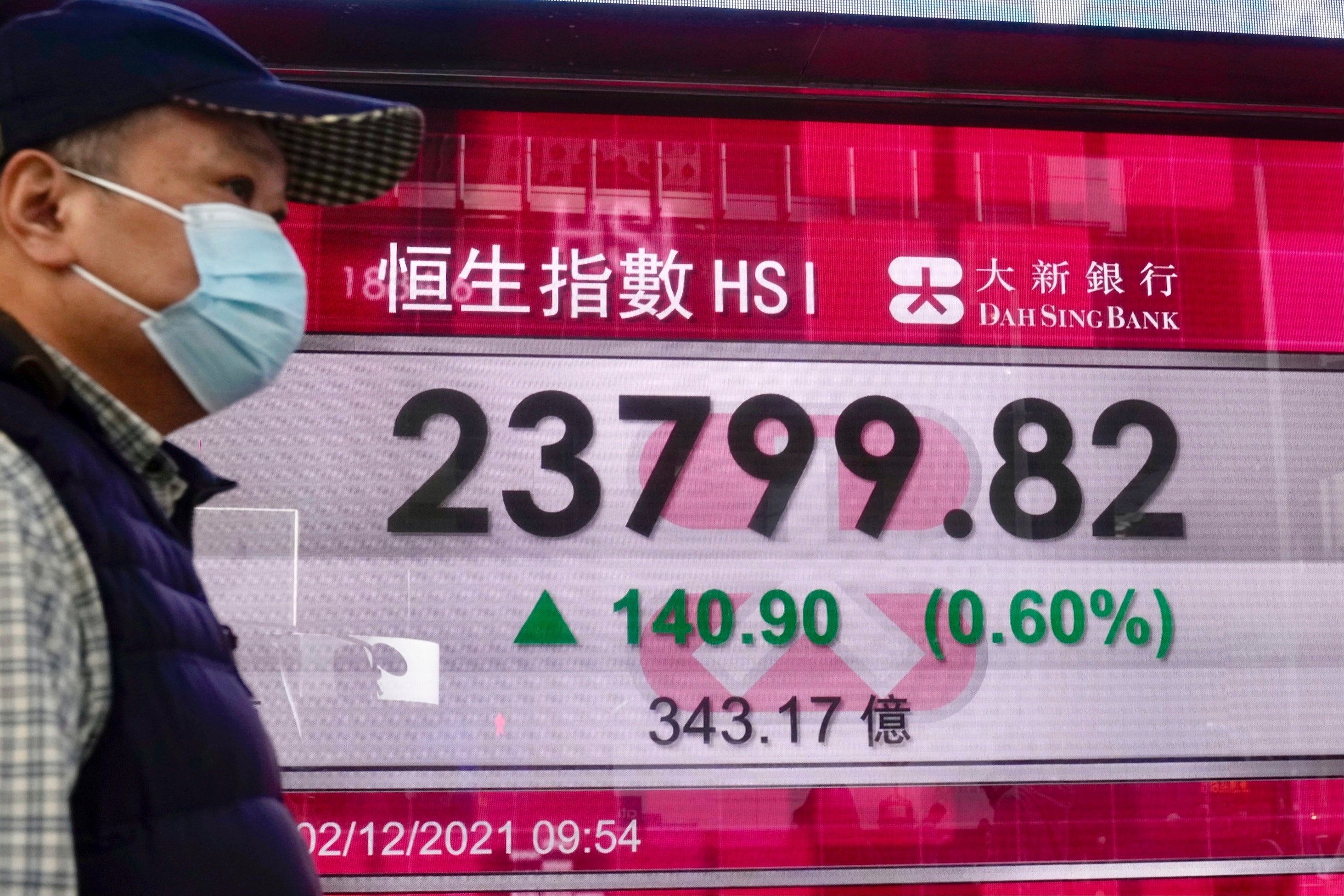Asian markets mixed after Wall St decline, virus unease
Asian stock markets are mixed after a turbulent day on Wall Street as traders tried to forecast the impact of the coronavirus’s omicron variant

Your support helps us to tell the story
From reproductive rights to climate change to Big Tech, The Independent is on the ground when the story is developing. Whether it's investigating the financials of Elon Musk's pro-Trump PAC or producing our latest documentary, 'The A Word', which shines a light on the American women fighting for reproductive rights, we know how important it is to parse out the facts from the messaging.
At such a critical moment in US history, we need reporters on the ground. Your donation allows us to keep sending journalists to speak to both sides of the story.
The Independent is trusted by Americans across the entire political spectrum. And unlike many other quality news outlets, we choose not to lock Americans out of our reporting and analysis with paywalls. We believe quality journalism should be available to everyone, paid for by those who can afford it.
Your support makes all the difference.Asian stock markets were mixed Thursday after a turbulent day on Wall Street as traders tried to forecast the impact of the coronavirus's omicron variant.
Tokyo and Sydney fell while Hong Kong and Seoul advanced. Shanghai was unchanged.
Wall Street's benchmark S&P 500 index ended down 1.2% on Wednesday after gaining 1.9% earlier in the day. That was despite surveys showing U.S. hiring and factory activity in November were better than expected.
Markets were sliding when the White House announced the discovery of the first omicron case in the United States. It is unclear whether omicron is more dangerous than other variants, but governments have responded by tightening travel controls, fueling unease about the outlook for a global economic recovery.
The latest data “painted an optimistic picture for economic conditions, but that seems to be taking a backseat as the omicron variant can potentially shift the landscape,” Yeap Jun Rong of IG said in a report.
The Shanghai Composite Index held steady at 3,577.03 while the Nikkei 225 in Tokyo lost 0.4% to 27,825.15. The Hang Seng in Hong Kong gained 0.2% to 23,714.00.
The Kospi in Seoul surged 1.1% to 2,930.47 while Sydney's S&P-ASX 200 lost less than 0.1% to 7,231.20.
India's Sensex opened up 0.6% at 58,037.76. New Zealand and Singapore fell while Jakarta advanced.
On Wall Street, the S&P 500 fell to 4,513.04. The Dow Jones Industrial Average declined 1.3% to 34,022.04. The Nasdaq slid 1.8% to 15,254.05.
The S&P 500 on Friday turned in its biggest loss since February, sliding 2.3%. It rose 1.3% on Monday and gave up 1.9% on Tuesday.
On Wednesday, the Institute for Supply Management reported U.S. manufacturing growth activity accelerated faster than expected in November. Payroll processor ADP said employers hired more people than expected. That might raise expectations for Friday's U.S. government jobs data.
Investors already were rattled after Federal Reserve chairman Jerome Powell said Tuesday the U.S. central bank might withdraw stimulus sooner than expected due to persistently high inflation.
The Fed's bond purchases are injecting money into the financial system, boosting stock prices. The S&P500 has more than doubled since March 2020.
In energy markets, benchmark U.S. crude rose 88 cents to $66.45 in electronic trading on the New York Mercantile Exchange. The contract fell 61 cents on Wednesday to $65.57. Brent crude, the price standard for international oils, gained 90 cents to $69.77 per barrel in London. It lost 36 cents the previous session to $68.87.
The dollar gained to 113.05 yen from Wednesday's 112.79 yen. The euro held steady at $1.1319.